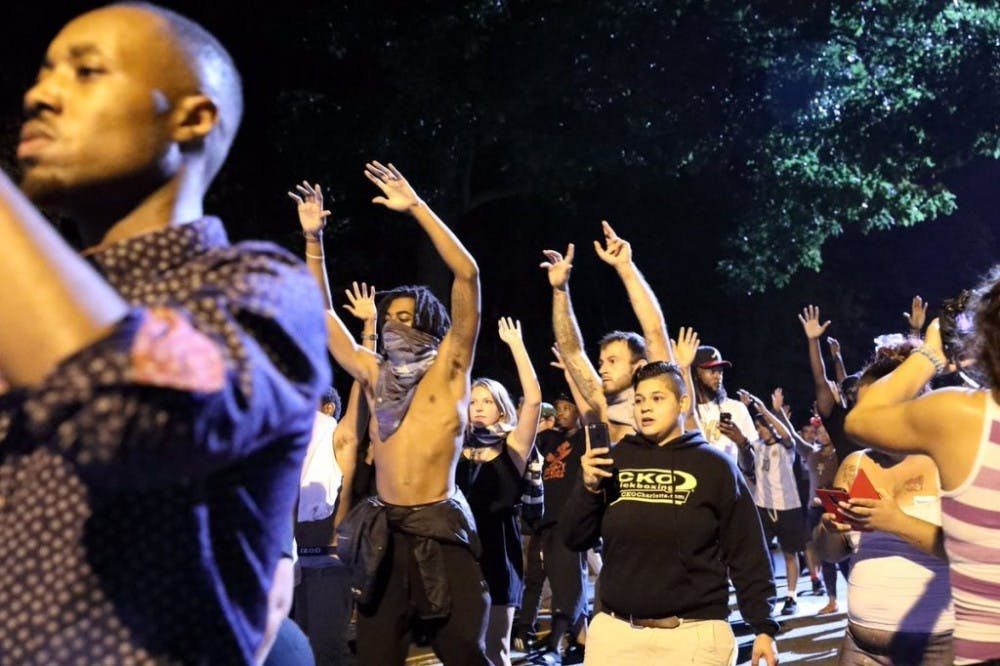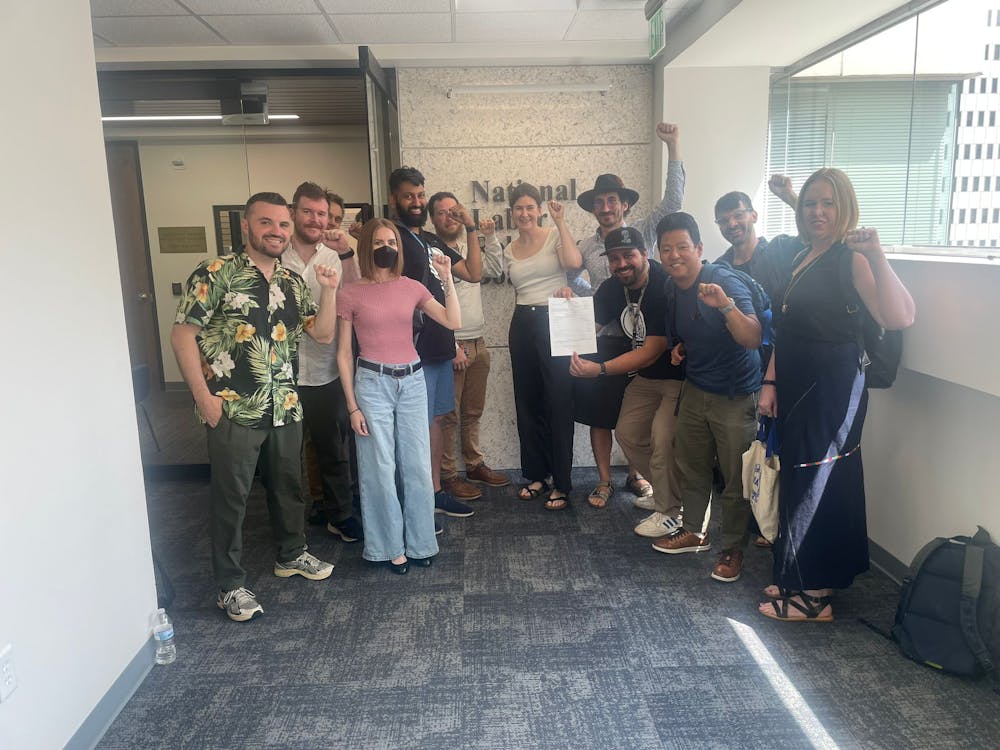Editor's Note: This is a developing story and will be updated as more information becomes available.
A second night of protests in Charlotte, N.C. over the shooting death of Keith Lamont Scott by police turned violent on Wednesday. One civilian, later identified as 26 year old Justin Carr, was shot and taken to a local hospital in critical condition. He was put on life support but died from his wounds on Thursday.
The City of Charlotte released a statement via Twitter on Wednesday, saying Carr had been shot by another civilian and not the Charlotte-Mecklenburg Police Department (CMPD). On Friday morning, a suspect in Carr's murder Rayquan Borum, 21, was arrested by CMPD.
Carr's mother Vivian said in an interview on "Anderson Cooper 360" that her son wanted to participate in the protest to make his grandmother, who marched with Martin Luther King, Jr., proud.
"I know he died for a cause," she said.
She also shared that her son had been eagerly anticipating the birth of his own son in late October.
"He was so excited about becoming a first-time dad," she said.
In the wake of escalating violence, North Carolina Governor Pat McCrory declared a state of emergency on Wednesday night, a few hours after Carr was shot, calling up the National Guard and State Highway Patrol. Four police officers experienced nonlife-threatening injuries during Wednesday night's protests.
Earlier Wednesday, hundreds of demonstrators shut down both lanes of Interstate 85. According to CMPD Chief Kerr Putney, a tractor-trailer was broken into and its contents were set ablaze. Police used tear gas to break up the crowd, which Putney described as a last resort.
"As always, our officers tried to facilitate demonstrations and protests... but when that behavior becomes violent, aggressive and destructive, we have to act as we did," Putney said at a news conference Wednesday morning.
Protests over Scott’s death first erupted Tuesday night and sixteen police officers were wounded.
Charlotte Mayor Jennifer Roberts addressed the ongoing chaos Wednesday.
"We are urging people to stay home, to stay off the streets," she said. "Violence is not the answer."
Scott’s widow, Rakeyia, released a statement Wednesday, condemning the violence.
"Keith was a loving husband, father, brother and friend who will be deeply missed every day," she said. "As a family, we respect the rights of those who wish to protest, but we ask that people protest peacefully. Please do not hurt people or members of law enforcement, damage property or take things that do not belong to you in the name of protesting."
Scott, a 43-year-old black man, was shot by CMPD on Tuesday afternoon. According to Putney, officers were looking for someone else with an outstanding warrant when they approached Scott, who was sitting in his car.
Police said in a statement Tuesday that officers had watched Putney before approaching and saw him exit. He then return to his vehicle with a gun in hand. When they confronted Scott, police say he exited his car with the gun and refused to lower it, posing an “imminent deadly threat.”
Brentley Vinson, the officer who shot Scott, is also black and has been with CMPD for two years.
Scott’s family says he was reading a book in his car while waiting for his son to come home from school and was unarmed. According to Putney, no book was recovered from the scene. U.S. Attorney General Loretta Lynch said Wednesday that the Justice Department will be “assessing” the shooting.
Scott’s daughter, Lyric, began recording the incident on Facebook Live moments after her father was shot and can be heard confronting officers.
"They shot my daddy 'cause he's black," she said. "He was sitting in his car reading a motherf**king book.”
Scott is survived by his wife and seven children.
Senior Corey Payne, co-president of Hopkins Students for a Democratic Society, emphasized how vital it is to discuss this event as a part of the racial tensions and police brutality debates that have taken a hold of the United States in the past several years.
“It's important to put this struggle in the context of the entire movement for black lives. People aren't rising up because one black man was murdered by police. People are rising up because his death is part of a pattern of state violence against black people — a pattern that is continuously traceable to before the founding of the republic,” Payne wrote in an email to The News-Letter. “Will the unrest swell beyond North Carolina? I certainly hope so. But these aren't singular events with singular reactions — the state violence is connected and the uprisings are connected.”
Junior George Gulino remarked that it is interesting to note how racial violence within cities has swelled since President Obama took office, which is contrary to what the American public would suspect.
“It's sad that, at the end of the Obama presidency, we are more divided along racial lines as a nation than we were before he took office,” Gulino wrote in an email to The News-Letter. “President Obama was widely seen as a figure who would unite the country. Instead, racial violence in our inner cities has returned in a manner reminiscent of the 1960s. It's interesting that almost all of these cities experiencing race riots are run by Democrats.”
Payne believes that the negative actions of the government and authorities have caused the violent backlash against police in cities throughout America.
“The events in North Carolina and in Oklahoma over the past few days just show again that this struggle is far from over — and it will not be won through traditional political channels. Only through collective action can we truly change a violent system,” Payne wrote. “It's important to put the causal mechanism in the right direction: the reaction of the oppressed comes in response to the violence of the oppressor. So long as our government continues to oppress, exclude and murder it's own citizens, how can anyone expect the outrage to stop?”
Sophomore Caroline Lupetini noted that history seems to keep repeating itself, and that these shootings and protests have become a regular occurrence in the U.S.
“I'm never surprised anymore — it's a vicious cycle of a police shooting, protests and the officer never being convicted and sometimes not even indicted. The protests in Charlotte are, of course, justified, and the response by police with riot gear and tear gas is infuriating and perpetuating the problem of a trigger-happy and militarized police force in this country,” Lupetini wrote in an email to The News-Letter. “It's unfortunate that this protest is becoming more violent than the concurrent ones in Tulsa, for example, but the anger, frustration and sadness in the black community is evident.”
She also pointed out that it is interesting because it was a black officer who shot a black man.
“The fact that the officer that killed Keith Lamont Scott is himself black may seem intriguing, but irrelevant to the larger and more important point that police in the United States act more like a paramilitary force than protectors of local communities,” Lupetini wrote.
Sophomore Anthony Garay expressed his sympathy for the unrest in North Carolina.
“My heart goes out to the Scott family and to the people of Charlotte. It's truly unfortunate to see that more injuries and shootings have happened as a result of the protests,” Garay wrote in an email to The News-Letter. “I can't help but remember watching the Baltimore riots unfold before I came to Hopkins, so I would urge the people of Charlotte to protest peacefully. Don't destroy your city and let’s not lose any more lives.”





